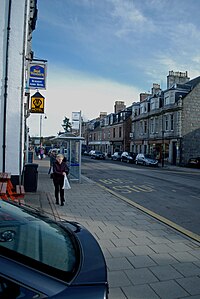Banchory-Ternan
Banchory
|
|
|---|---|
 Banchory High Street |
|
| Banchory shown within Aberdeenshire | |
| Population | 7,520 (Aberdeenshire Council) |
| OS grid reference | NO698958 |
| Council area | |
| Lieutenancy area | |
| Country | Scotland |
| Sovereign state | United Kingdom |
| Post town | BANCHORY |
| Postcode district | AB31 |
| Dialling code | 01330 |
| Police | Scottish |
| Fire | Scottish |
| Ambulance | Scottish |
| EU Parliament | Scotland |
| UK Parliament | |
| Scottish Parliament | |
Banchory (Scots: Banchry, from Scottish Gaelic: Beannchar) is a burgh or town in Aberdeenshire, Scotland. It is about 18 miles west of Aberdeen, near where the Feugh River meets the River Dee.
The name is thought to be derived from an early Christian settlement founded by St Ternan. It is claimed that Ternan was a follower of St Ninian. Tradition has it that he established his settlement on the banks of the River Dee on what was later to become the kirkyard of the medieval parish of Banchory-Ternan. The village and parish retained the name until the 1970s. The original Gaelic form is almost identical to that of Bangor, of similar meaning, and also the site of a monastery, in Northern Ireland. Relics associated with St. Ternan were preserved by hereditary keepers at Banchory until the Scottish Reformation. Two early Christian cross-slabs survive in or near the old churchyard on the site of the early church. One is built into a corner of the 'mort house' in the churchyard, and shows two crosses incised in a worn pink granite slab. The other is a ringed cross in relief built into the wall facing the main road outside the churchyard.
Banchory is the largest town in the area and has a High Street. There are a number of hotels and restaurants including the Stag Hotel, Scott Skinners Bar and Restaurant, the Burnett Arms, and the Douglas Arms. The shops include newsagents, sports shops and chemists. Since the 1970s, the town has grown steadily. Since 2001 there has been rapid expansion. A large forested area 'the Hill of Banchory', owned by the Burnett family (owners of Crathes Castle), to the north east of the town has been replaced by a large housing estate and an influx of new residents. The Hill of Banchory primary school was opened in 2006 to cater for the increased population.
The Kinneskie Road drill hall was completed in around 1908.
...
Wikipedia

